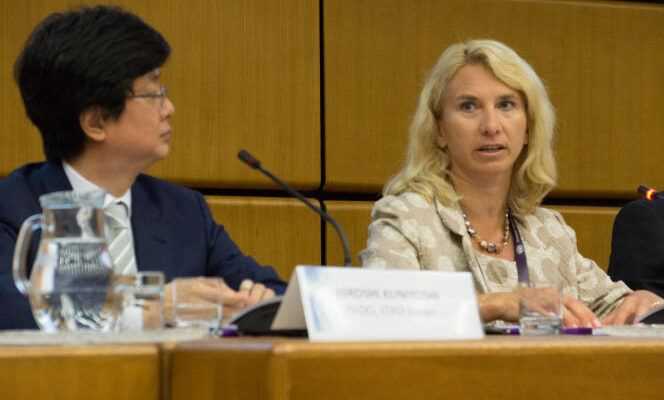On Thursday 4 November, the European Bank for Reconstruction and Development (EBRD) revised upwards the 2021 growth forecast (5.5%, against 4.2% expected in June) for the 30 countries where it operates, Baltic States to Central Asia. Beata Javorcik, chief economist of this institution born in 1991 to support the economic transition of the post-Soviet space, nevertheless underlines that the resurgence of inflation and Covid-19 threatens the recovery.
While the International Monetary Fund (IMF) lowered its growth forecast in October, you are revising yours upwards. Why this optimism?
The IMF is a little more pessimistic about the large advanced economies. We are more positive for the countries we monitor, because the mobility of people has rebounded there faster than expected: it returned to its pre-pandemic level in May, compared to September for the whole world. However, mobility is decisive for economic activity: when it drops by 10%, GDP falls by 2%. These countries, relatively dependent on industry, also benefited from export demand, which remained strong. Some also have a reasonable level of vaccinations, such as Turkey, where two-thirds of the population have received a first dose.
In spite of everything, contaminations are flaring up again in many countries. Could this derail the recovery?
This is one of the sources of concern and the reason why we call this recovery “bittersweet”. In the region, the number of Covid-19-related deaths per million inhabitants is already four times higher than the global average. This is particularly the case in Bulgaria, Montenegro or Romania with the low percentage of people vaccinated. But it is not a problem of accessibility of vaccines. The message of governments, which seek not to alienate the skeptical part of the electorate, lacks clarity. In addition, the incentives to be vaccinated, such as the obligation to have a health pass to work in force in Italy, are weak.
Which countries will be the most weakened by the resurgence of inflation?
This is the other cloud hanging over the recovery. The share of irreducible expenditure linked to heating and energy represents, for example, 25% of household expenditure in Romania and 22% in Hungary, against 7% in Germany. Inflation will severely penalize the poorest 10% of households in Eastern Europe and Central Asia: for them, the share of this energy expenditure is 28% on average, against 19% in Italy or Germany. The pressure for governments to take measures in favor of these households will therefore increase. Moreover, in many of these countries, wages are rising and pensions are indexed to the price index, which will fuel inflationary pressures.
You have 46.87% of this article to read. The rest is for subscribers only.
